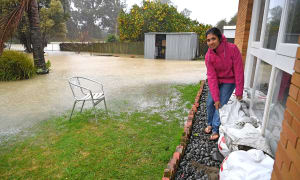Clive Bibby is a farmer, consultant and commentator who lives in Tolaga Bay.
A recent 1News story focusing on the local Burgess farming family struggling in the aftermath of last year’s cyclone damage to their livelihoods was a graphic reminder of the human collateral damage from such events.

But the real tragedy behind the piece is that the magnitude of the problem would have escaped most of the nation’s viewers. While that is understandable in the circumstances, it is nonetheless very, very sad and highlights the real difficulty of finding a way to alleviate their suffering.
As someone who has experienced similar damaging effects to my own property from the same monster storm, I identified with every heartfelt cry for help.
Yet the survival of those brave people will depend on much more than the sympathy being offered by those of us who understand what this could mean for the families trying to keep their heads above water.
Unfortunately, because they need a complete reinstatement of their lifeline bridge — which is a big-ticket item — their fate will depend almost totally on government financial assistance.
And because these decent, hard-working souls’ particular problem is low on the priority order for this type of repair work, they may not be able to wait for the “cavalry to come over the hill”.
This farming family have owned and operated their property for four generations, which in farming terms means they are extremely good at what they do.
Remote properties like this one are more vulnerable than most because they are so dependent on the roading infrastructure being maintained on a regular basis.
For them, if the bridge or parts of the rural road linking their property to the outside world are damaged beyond repair, it becomes only a matter of time before decisions have to be made as to whether they can carry on operating what used to be a profitable business.
Put simply, as the farmer did in the TV coverage we saw — for them, it could mean the end.
But the real tragedy in this stark portrayal of human endeavour battling the odds is that this couple are representative of too many other farming families who are also in this disastrous position through no fault of their own.
If it had been an isolated case, as often happens with storm damage, this bridge would have been replaced months ago.
Unfortunately, because the damage to rural infrastructure has been so widespread across a number of rural provinces, even the Government’s own budgeted financial resources are at breaking point and local authorities (the ones with responsibility for distributing the assistance packages) are having to set priorities for repair work.
That means those roads that only service one or possibly two properties will have to wait until the help they need arrives.
In the meantime, their struggle for survival continues — and who knows when it will end. It matters not that both Governments have bent over backwards since the cyclones of early 2023 wreaked havoc to ensure relief is available to those who need it most.
It is notable that the current Government has allocated more funding for this ongoing priority spending, but it may be — for those teetering on the cliff face of bankruptcy — too little too late.
These acts of God can be, for those involved, just as devastating as the damage currently being done to livelihoods as the result of war in Ukraine.
But, again, we should be asking — who cares enough?






